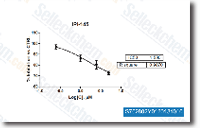Our examine would be the initially to demon strate immediately that Akt activation is diminished when SR BI is knocked down or pharmacologically inhibited. Additional more, in agreement together with the previously pointed out examine, we showed that proliferation of MDA MB 231 cells was appreciably inhibited by downregulation of SR BI protein ranges and by pharmacologic inhibition of SR BI. Moreover, we observed that SR BI knockdown inhibits migration. This getting may recommend a position for SR BI inside the initiation of metastasis. Finally, we demonstrated that knockdown of SR BI in MDA MB 231 cells can cause reduced tumor growth in vivo accompanied by enhanced activation of Erk1/2 and Akt, and an increase in cellular apoptosis. In MCF7 cells, knockdown of SR BI also led to lowered xenograft tumor growth.
Earlier scientific studies have shown that Akt can inhibit apoptosis by various mechanisms, together with the phosphorylation of Lousy, therefore avoiding Trametinib distributor cytochrome c release from mitochondria and also the direct inhibition of the caspase activation cascade. Greater cellular choles terol levels are already proven to increase Akt activation and lessen apoptosis in prostate cancer cells. Con sistent with these observations, a recent examine showed that inhibition of xenograft tumor growth could be achieved with colon cancer cells that re express the ATP binding cassette transporter A1. ABCA1 is often a lipid transporter that mediates the efflux of cellular cholesterol to lipid free apolipoprotein A I. Moreover, within this study, re expression of ABCA1 resulted in decreased mitochondrial cholesterol information and greater release of cytochrome c, which in the long run led to greater apoptosis. Our work also indicated that SR BI knockdown can sig nificantly minimize apoptosis in xenograft tumors, as proven by TUNEL staining.
Consequently, a reduction from the levels of cellular cholesterol articles could possibly be accountable, not less than in aspect, for selleck the decreased apoptosis observed in our model. Taken collectively, these data also recommend an im portant part for cholesterol in the regulation of cellular signaling pathways and tumor formation. Importantly, ex cess cellular cholesterol accumulates from the kind of esteri fied cholesterol. Prior performs and ours propose that the accumulation of esterified cholesterol may cause a modification of signaling pathways associated with proliferation and migration in tumors. Constant with this particular hypothesis, increasing cellular esterified choles terol levels have already been proven to induce cellular prolifer ation and improve  invasiveness of tumor cell lines. Conversely, the inhibition of cholesterol esterification has become shown to get the reverse effect. Conclusions In summary, our effects propose that HDL and SR BI have professional oncogenic activity and will induce migration and acti vate signal transduction pathways responsible for cellular proliferation and tumor formation in two breast cancer cell lines.
invasiveness of tumor cell lines. Conversely, the inhibition of cholesterol esterification has become shown to get the reverse effect. Conclusions In summary, our effects propose that HDL and SR BI have professional oncogenic activity and will induce migration and acti vate signal transduction pathways responsible for cellular proliferation and tumor formation in two breast cancer cell lines.
DNA metabolism
Siteman Cancer Center's DNA Metabolism and Repair Program includes 23 investigators
